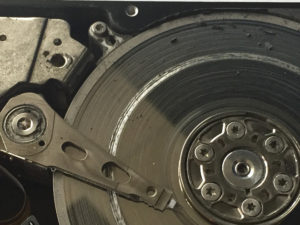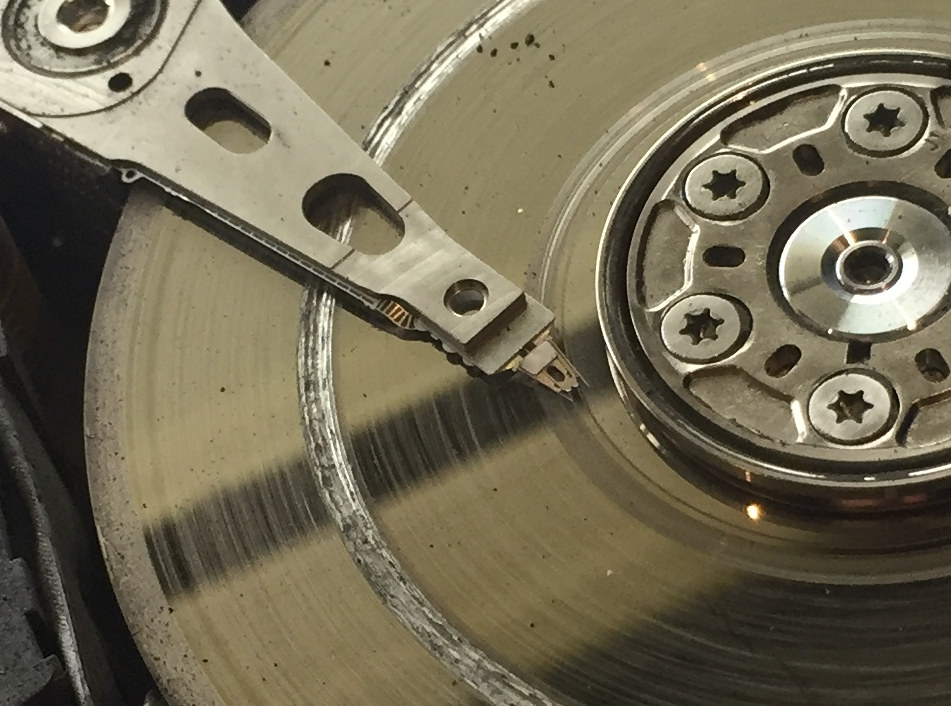
This hard drive shows rough platter damage where the head remained in contact with the platters for several hours of operation.
Data loss can be classified as physical, which is a hardware issue, or logical, which is a software issue.
That’s the basic idea — but in many data loss scenarios, damage can be described as both logical and physical.
For example, data corruption occurs when a storage device encounters errors when reading, writing, or processing data. This is a logical issue, but it may be caused by a physical malfunction.
When hard drives start to fail, their actuator heads (the component that changes magnetic charges on the platters, which store your data) may not be able to read and write data properly. That’s a physical issue, even though the corruption that occurs as a result of the head failure is logical.
Below, we’ll explain more about the differences between logical and physical data loss and how different issues can affect the data recovery process.
If you’ve encountered data loss, we’re here to help. Call us at 1-800-237-4200 to speak with an expert or submit a case online for a free media evaluation.
Common Types of Physical Data Loss
Hard drives have more components than solid-state drives (SSDs), and many hard drive components move during operation (and by the way, if you’ve upgraded to an SSD and you miss the sounds of your old hard drive, there’s a dongle for that).
As such, hard drives are more commonly associated with physical data loss. Some of the most common physical data loss scenarios include:
- Actuator head failure (also called a head crash)
- Bad sectors
- Spindle failure
- Electronic board (PCB) failure
- Fire or water damage
Physical data loss may cause hard drives to present physical symptoms such as clicking, whirring, or grinding sounds. However, some physical failures do not cause these symptoms.
SSDs may lose data physically due to failed electronic boards or premature memory wear. However, firmware issues — which can be classified as logical failures, depending on the scenario — are much more common.
Related: How Can I Tell If My Hard Drive is Broken?
Common Types of Logical Data Loss
Any non-physical issue can be classified as a logical failure. Some of the most common examples:
- Accidental file deletion
- Software errors that result in file corruption
- Firmware issues (which may cause physical failures)
- Malware (including viruses, Trojans, and ransomware)
- Accidental repartitioning or partition loss
- File corruption that doesn’t involve a physical failure (such as corruption caused by an improper shutdown)
When logical data loss occurs, it’s important to seek professional data recovery as soon as possible. Operating your storage device may overwrite the data. While data recovery software can be effective in some cases, you’ll need to install the software on a separate device — and generally speaking, you’ll only get one chance to recover your files.
For that reason, we recommend working with professional data recovery specialists unless you can recreate the data if the recovery attempt fails.
Related: Before Using Data Recovery Software, Read This
Is logical data loss better for data recovery?
One common misconception: If a storage device is in perfect working condition, data recovery is easier (and therefore, less expensive).
That’s not always true. In some instances, cleanroom data recovery is extremely straightforward — engineers may be able to quickly swap out damaged parts, then clone the hard drive (or SSD). Recovering a deleted file or lost partition could require more resources than physical data recovery, depending on the scenario.
This is one of the reasons that we don’t recommend flat-rate data recovery services. All data loss needs to be evaluated in order to create a strategy that maximizes the chances of recovery.
The good news: If you need to recover files from any storage device — regardless of the failure scenario — you don’t have to waste your money. Datarecovery.com offers free media evaluations, and all cases feature our no data, no charge guarantee. If we can’t recover the files you need, you don’t pay for the recovery attempt.
Get started by submitting a case online or discuss your case by calling 1-800-237-4200.







